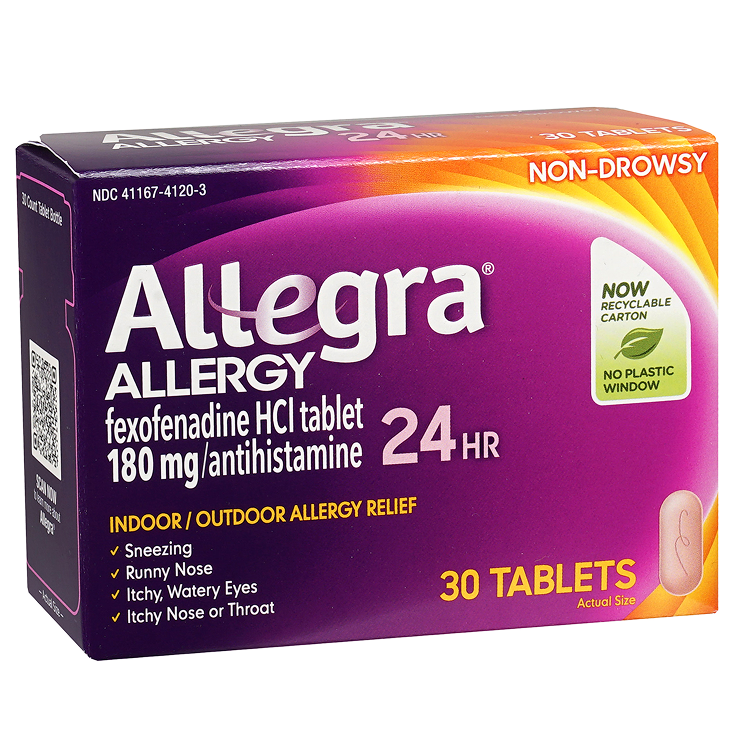Fluoride Facts:
The truth? It keeps your teeth strong, protects against cavities, and supports a healthy smile at any age. Our guide cuts through the noise so you can feel confident about your choices and do what's best for yourself and your family.
Fexofenadine is an antihistamine used to relieve allergy symptoms. It works by blocking histamines, substances in the body that cause allergic reactions. Fexofenadine is non-drowsy, making it a preferred choice for those needing symptom relief without sedation.
Symptoms Treated
Symptoms Treated
More specifically:
Helps to relieve allergy symptoms of seasonal allergic rhinitis (hay fever), which includes: sneezing; runny nose; itchy, watery eyes; itchy throat or nose; itchy skin and rash. It is also used to help treat symptoms of Chronic idiopathic urticaria (hives).
Common Products
Other Products:
- Allegra-D® (combines fexofenadine with a decongestant)
- Other generic versions
Dosing Information
Different types of products containing this active ingredient have different strengths. That’s why it is always important to read and follow the Drug Facts label. Most medicines warn against use of an active ingredient for longer than 7-10 days. Stop use and ask a doctor if symptoms persist.
A Note to Families:
1. Scientific and medical authorities around the world recognize acetaminophen as the only analgesic considered safe for use throughout an entire pregnancy when used according to the Drug Facts label.
2. There are no studies showing that acetaminophen use in children or during pregnancy causes autism.
3. Autism has many known risk factors, including genetics, but there is no clear, single cause.
4. Major health authorities like the FDA, CDC, and healthcare organizations such as the American College of Obstetricians and Gynecologists (ACOG) do not have warnings against acetaminophen use during pregnancy based on any known risk of autism and all recommend acetaminophen as the safest analgesic to use during pregnancy for short-term pain relief.
Frequently Asked Questions:
In fact, the Autism Science Foundation (ASF), a non-profit organization funding scientific autism research, specifically states that: it is disingenuous and misleading to boil autism's causes down to one simple thing," as there are hundreds of genes linked to autism in addition to other complex environmental factors.
Additionally, the most recent and rigorous research on this topic does not show a causal link to autism. The 2024 study published in the Journal of the American Medical Association (JAMA) analyzed nearly 2.5 million children using the gold-standard sibling comparison method, which controls for shared genetics and family environment, and found no association between acetaminophen use during pregnancy or infancy and neurodevelopmental issues such as autism.
- CDC Yellow Book (Current as of April 23, 2025): “Acetaminophen remains the non-opioid analgesic of choice during pregnancy.”
- FDA’s Acetaminophen Page (Current as of August 14, 2025): “To date, FDA has not found clear evidence that appropriate use of acetaminophen during pregnancy causes adverse pregnancy, birth, neurobehavioral, or developmental outcomes.”
Additionally, the Society for Maternal-Fetal Health, a professional organization for obstetricians with subspecialty training in maternal-fetal medicine, stated on September 25, 2025 that it: "...continues to advise physicians and patients that acetaminophen is an appropriate medication to treat pain and fever during pregnancy…the weight of scientific evidence that acetaminophen use during pregnancy causes an increased risk for autism or ADHD is simply inconclusive…”
Fluoride Facts:
The truth? It keeps your teeth strong, protects against cavities, and supports a healthy smile at any age. Our guide cuts through the noise so you can feel confident about your choices and do what's best for yourself and your family.
Safety Guide
Safety Guide
Fexofenadine is approved by the U.S. Food and Drug Administration (FDA) and is safe and effective when used according to the Drug Facts label directions. Here are some safe use tips:
Before taking fexofenadine:
- tell your doctor and pharmacist if you are allergic to fexofenadine, any other medications, or any of the ingredients in fexofenadine tablets or suspension. Ask your pharmacist for a list of the ingredients.
- tell your doctor and pharmacist what prescription and nonprescription medications, vitamins, nutritional supplements, and herbal products you are taking or plan to take. Be sure to mention either of the following: erythromycin (E.E.S., E-Mycin, Erythrocin) and ketoconazole (Nizoral). Your doctor may need to change the doses of your medications or monitor you carefully for side effects.
- if you are taking an antacid containing aluminum or magnesium (Maalox, Mylanta, others), take the antacid a few hours before or after fexofenadine.
- tell your doctor if you have or have ever had kidney disease.
- tell your doctor if you are pregnant, plan to become pregnant, or are breast-feeding. If you become pregnant while taking fexofenadine, call your doctor.
Fexofenadine may cause side effects.
Talk with a healthcare provider if any of the following symptoms becomes severe or does not go away:
- headache
- dizziness
- diarrhea
- vomiting
- pain in the arms, legs, or back
- pain
- pain during menstrual period
- cough
Some side effects can be serious. If you experience any of these symptoms, call your doctor immediately:
- hives
- rash
- itching
- difficulty breathing or swallowing
- swelling of the face, throat, tongue, lips, eyes, hands, feet, ankles, or lower legs
- hoarseness
- difficulty swallowing or breathing
Please note that fexofenadine may cause other side effects not listed. Talk with a healthcare professional if you experience any unusual problems while taking this medication.




.svg)


